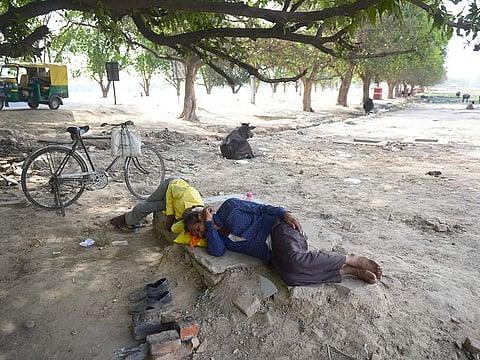Exceeding 1.5C global warming risks 'irreversible impacts': draft UN report
Additional 420 million people could be exposed to extreme heatwaves

Paris: Warming for decades above 1.5 degrees Celsius — the temperature guardrail of the Paris climate deal — will have “irreversible impacts to human and ecological systems”, according to a draft UN report obtained exclusively by AFP.
The Intergovernmental Panel on Climate Change report, a 4,000-page assessment of climate impacts, warns of the dire consequences facing humanity if it fails to rein in carbon emissions.
“Life on Earth can recover from a drastic climate shift by evolving into new species and creating new ecosystems,” a draft summary says. “Humans cannot.”
An additional 420 million people will be exposed to extreme heatwaves if temperatures rise by two degrees Celsius, the report warns.
The draft assessment also says that up to 80 million more people than today could be at risk of hunger by 2050 if emissions driving global warming are not rapidly curtailed.
“The worst is yet to come, affecting our children’s and grandchildren’s lives much more than ours,” says a summary of the report.
Here are some of the report’s findings on impacts on nature:
Natural systems
The report warns that after previous drastic climate shocks like the one currently facing the planet, the recovery of ecosystems, food webs and biodiversity took millions of years and involved the emergence of entirely new species.
- Many land, freshwater, ocean and coastal ecosystems are already “near or beyond” limits to their ability to adapt to climate change
- At two degrees Celsius - the Paris climate deal aims for “well below” this - around 15 per cent of the planet’s permafrost could be lost by 2100. This would release between 36 and 67 billion tonnes of carbon from the frozen soil - a vicious-circle “feedback loop” that would cause more warming
- Extreme events combined with longer-term climate trends are pushing ecosystems towards tipping points “beyond which abrupt, and possibly irreversible, changes may occur”
Species
The outlook for the world’s living creatures is looking perilous, the report makes clear.
- Extinction rates are accelerating dramatically and are estimated to be a thousand times higher than before the impact of human activities on the Earth last century
- Faced with rising temperatures, many plants and animals will shift hundreds of kilometres from their natural habitats by the end of the century
- Up to 54 per cent of land and sea species are threatened with extinction this century if Earth warms two degrees Celsius to three degrees above preindustrial levels. High mountain and island species are particularly at risk
- Even in a plus-two-degree world, polar animals like penguins, seals, polar bears, along with warm-water coral reefs and mangroves, will be under severe threat
Forests
A dangerous mix of higher temperatures, dry conditions and drought means that wildfire seasons across the planet are longer and potentially burnable areas have doubled in size.
- High emissions could mean drought and wildfire transform half the Amazon rainforest to grassland, a tipping point that would release carbon
- In the Arctic tundra and boreal forest, the area burned by wildfires increased nine-fold across Siberia from 1996 to 2015
- Restoring forests can store carbon and help reduce human vulnerability to climate change. But planting trees in places outside of natural forests - like in grasslands and savannahs - can hurt biodiversity and increase climate risks
Oceans
The last time oceans saw the levels of acidification and depleted oxygen projected for 2100 under a high emissions scenario was some 56 million years ago.
- Marine heatwaves - which can damage and kill coral, kelp forests, seagrass meadows and invertebrates - became 34 percent more frequent and 17 percent longer between 1925 and 2016
- 70 to 90 per cent of the world’s coral reefs are projected to decline with just 1.5 degrees Celsius of global warming. Beyond that they will suffer “more extensive losses”







